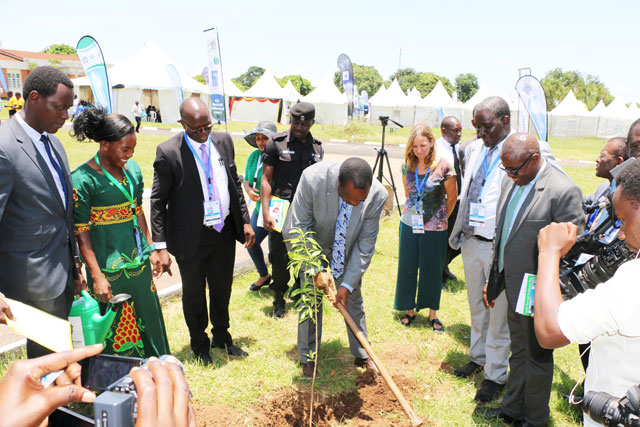
Entebbe, Uganda | THE INDEPENDENT | The former chairman of the National Planning Authority Dr Kisamba Mugerwa has expressed optimism that Uganda will achieve sustainable Development Goal 6 (SDG6) by 2030.
He was making a submission during the panel discussion on “Water and Environment a strategic driver in attainment of SDGs 2030” – the theme of the ongoing Uganda Water and Environment Week (UWEWK) 2019 in Entebbe.
“Uganda was among the firs top ten countries to come up with a plan aligned with the SDGs so we do not need to back to start writing other frameworks to meet the SDGS, ” he said, adding that Uganda should be more interested in its priorities, rather than SDGs per se – after all the two rhyme.
SDG 6 calls for clean water and sanitation for all people.
Dr Kisamba said that going forward Uganda only needs to start monitoring progress in comparison to international provisions to which the country is signatory.
Specifically on water resources, Dr Kisamba said it is important to balance the need for development and need for water.
“We have to use creation wisely and sustain-ably,” he said, arguing that it is not enough to protect trees and forests, but also to use them sustain-ably.
He said there is need to reduce wastage of water at household level and to apply innovative water saving technologies at community level.
Also on the panel was Dr Silver Mugisha, Managing Director of National Water and Sewerage Corporation (NWSC) who argued that failure to progress towards SDGs could be attributed to myriad of factors key among them is poor planning, lamenting without action, climate change and lack of knowledge sharing with actors. “We work a lot in silos. We need collective and collaborative action,” Mugisha said.
Speaking from the private sector perspective, Onapito Okomoloit, Nile Breweries Corporate Communications Manager said that businesses, and not just breweries, largely depend on water resources.
He said that their business thrives on water and plants, which are key parts of the water cycle. Where water quality is compromised, they incur higher costs of treating it. “We should not just worry about water, we should do something about it,” he said.
Earlier in the day, the Minister of Water and Environment Samuel Cheptoris said water and environment contribute significantly to national socio-economic development, although most of the time they are taken for granted.
This was at the opening of the second Uganda Water and Environment Week (UWEWK) in Entebbe, 18th March 2019 whose theme is: Water and Environment a strategic driver in attainment of Sustainable Development Goals (SDGs) 2030.
Cheptoris said that Uganda requires substantial investments in the management of environmental and water resources to attain the country’s goals stated in Vision 2040. He reiterated the message that water resources are essential for many economic and social activities including agriculture, livestock, fisheries, and industrialization among others.
He observed that perceived limits in water for manufacturing is due to poor management which led to 5% decline in the Gross Domestic Products (GDP) by 2040.
“As Uganda seeks to industrialize and meet its national development goals, water and environment resources management will be critical to ensure steady growth of manufacturing, agricultural and service sectors,” he asserted.
In his keynote address, the Director Water and Environment Centre Denmark, Peter Koefoed observed that Uganda had devoted significant effort to provide its population with safe water and sanitation services and strengthened water resources management.
However, Koefoed said, there were still some challenges yet to be resolved. He particularly referred to Lake Victoria, which continues to suffer pollution from various activities, which has changed the lake from its natural state towards hypertrophic state which has affected the fisheries sector.
He said, “800 million people worldwide lack access to safe water while two billion lack access to sanitation sanitation. At the same time, water pollution continues along economic activities which place a high level of stress on water resources,” Koefoed said. The lack of access to clean safe water and to sanitation facilities increases the disease burden among the population.
*****
SOURCE: UWEWK newsletter
 The Independent Uganda: You get the Truth we Pay the Price
The Independent Uganda: You get the Truth we Pay the Price



